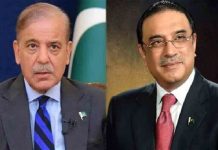—– Asserts we have irrefutable evidence of Indian-sponsored terror-ism in Pakistan
—– Avers India’s hostile attitude is our primary concern
—– Informs Kabul arrested suspects in connection with terrorism in Pakistan
—– Stresses safe, secure environment for UN peacekeepers
—– Says Pakistan has longstanding commitment to UN peacekeeping
By Asghar Ali Mubarak
ISLAMABAD: Caretaker Foreign Minister (FM) Jalil Abbas Jilani on Thursday ac-cused India of interfering in the internal affairs of Pakistan.
In an informal chat with beat reporters in Islamabad, Jeelani said, “We have irrefu-table proofs of India’s involvement in our internal affairs.”
“India’s hostile attitude is our primary concern,” he pointed out. Jilani said that ties with the neighbouring country could not be normalized unless both the countries resolved their core issues. “India and Pakistan have thrice fought wars on Kashmir, and the dispute is a major stumbling block in the way of progress on other issues,” he said, and added, “We will talk to India on the basis of our principled stand. The solution to Kashmir issue lies in implementation on the UN resolutions.”
The foreign minister also accused India of occupying Siachen. “We want to resolve the issue in the light of the Benazir-Rajiv agreement,” he told reporters.
Jilani did not forget to mention the water dispute between India and Pakistan ei-ther. “India has blatantly violated the Indus Waters treaty,” he claimed.
India, he went on to say, was also an obstacle in holding the SAARC conferences.
The FM expressed the hope that the Indian government would provide foolproof security to Pakistan cricket team during its stay in the country in connection with the World Cup. He also dispelled the impression that Pakistan was part of power politics.
Jilani informed that both he and the US under-secretary of state talked about hold-ing general elections in the country on time. “Presently our relations with the USA are quite strong,” he said, adding, “In our talks, we both agreed to further strengthen these ties and enhance cooperation.”
The foreign minister disclosed that the annual trade volume between Pakistan and the USA had reached $20 billion. “America has not asked us to stop doing trade with either China or Russia,” he said categorically, and stressed the need for a peaceful resolution of the Ukraine issue.
When asked about the US cipher, he refused to make any comment, saying the matter was sub judice. “We neither interfere in other countries’ matters nor we like any country to interfere in ours,” he said.
Responding to a question about an allegation levelled by a political party that Paki-stan was pressured by foreign powers, he said there was no such thing.
He said that the interim setup had the capability to attract major investment de-spite its stay in office for a limited time period.
The FM informed that the Taliban government in Afghanistan had arrested some people in connection with incidents of terrorism in Pakistan, and informed us ac-cordingly.
He further said that 1,000 to 2,000 containers passed through Pak-Afghan border daily.
He told reporters that the caretaker government would go ahead with its efforts for the completion of Pak-Iran gas pipeline project. “The China-Pakistan Economic Corridor (CPEC) has started giving results as evident by the country’s progress,” He made it clear that it was the Election Commission of Pakistan’s (ECP) and not caretaker government’s job to hold general elections.
He said that elections would be held within the time period given in the constitu-tion. “Our job is to ensure free and fair elections,” he said.
The FM further said that the caretaker setup was basically apolitical, and it would not interfere in politics. “Our mandate is limited,” he said, adding, “I have no doubt in my mind that we have come for a limited time period.”
‘Longstanding commitment to UN peacekeeping’
Caretaker Foreign Minister Jalil Abbas Jilani on Thursday said ensuring a safe and secure environment for United Nations peacekeepers who tirelessly maintain peace around the globe should be the foremost priority.
Addressing the 2023 UN Peacekeeping Ministerial Preparatory Meeting on “Safety and Security of Peacekeepers” here, the foreign minister said Pakistan’s participa-tion in UN peacekeeping, spanning over six decades, was a tangible manifestation of its contribution to the maintenance of international peace and security, in line with the UN Charter.
He said legal frameworks and adequate accountability mechanisms were para-mount for peacekeeper safety. “We must stand firm in holding accountable the perpetrators – individuals and groups that harm or threaten UN peacekeepers.”
Medical care for peacekeepers is also essential, he said adding “our peacekeepers deserve the best care including mental health support. Standardized training, first aid provisions, and enhanced medical facilities are crucial for that”.
The FM maintained that addressing challenges, including language barriers and administrative obstacles, should also be one of our top priorities.
He said the spectre of threat posed by Improvised Explosive Devices (IEDs) to peacekeepers’ security needs a commensurate response. “We must intensify pre-deployment training; equip our peacekeepers with cutting-edge technology; and augment their capabilities for countering the IED threat.”
The minister highlighted that leveraging technology was vital to ensure the safety and security of peacekeepers. “The Strategy for the Digital Transformation of UN Peacekeeping underscores the need to enhance situational awareness, counter dis-information, and optimise the use of technology. By doing so, we empower our peacekeepers to make informed decisions and fulfil their mandates more effective-ly.”
Jalil Abbas Jilani said while Pakistan was proudly contributing over 4,000 troops to various ongoing UN peacekeeping missions, the attention should also be focused on the realm of peacebuilding.
“Just as we have established a state-of-the-art facility for the training of peace-keepers – the Centre of International Peace and Stability (CIPS), where we are gathered for this meeting – we also hope to collaborate with the UN Secretariat and our international partners to create an Institute for Peacebuilding,” he re-marked.
He also urged the finance contributing partners to embrace a more equitable distri-bution of the burdens associated with peacekeeping missions.
The challenges faced by peacekeepers, he said were universal in their impact, and it was imperative that the financial responsibilities reflected this shared endeavour for global peace and security.
“Open and constructive dialogue between TCCs and FCCs is essential to harmo-nize our efforts, ensuring that resources are allocated efficiently and fairly. Trans-parency in financial commitments and decision-making processes is key to build-ing trust and enhancing mission efficacy,” he added.
Emphasizing the significance of the United Nations Military Observer Group in India and Pakistan (UNMOGIP), a pioneering peacekeeping mission established in 1949, the foreign minister said it held a distinctive place in peacekeeping history as one of the earliest initiatives to monitor and investigate ceasefire violations in the disputed territory of Jammu and Kashmir.
“UNMOGIP personnel encounter unprecedented adversities due to the non-cooperation of one party. We must proactively address the safety and security gaps, as identified in the recent report on UNMOGIP by the UN’s Office of Internal Oversight Services, he added.
?He also acknowledged the indispensable and rightful role of women peacekeepers saying Pakistan was constantly endeavouring to further enhance the presence of female peacekeepers in its contingents.
He said women bring unique perspectives and skills that were instrumental in fos-tering trust and building relationships with local communities. Their presence not only promotes gender equality but also strengthens our peacekeeping efforts. “We must create an environment that empowers women peacekeepers and ensures their safety and security.”
The minister also eulogized the profound sacrifices by the dedicated peacekeepers in the line of duty. “These brave men and women leave behind the comfort of their homes, risking their lives to bring stability to war-torn regions”, he added.




